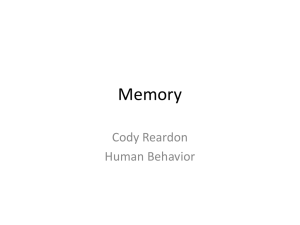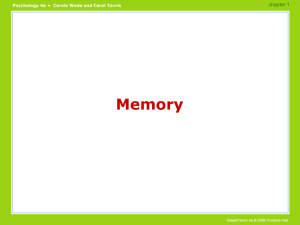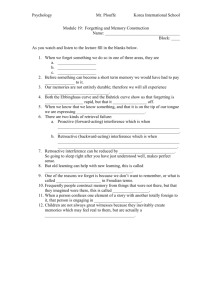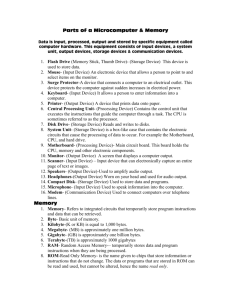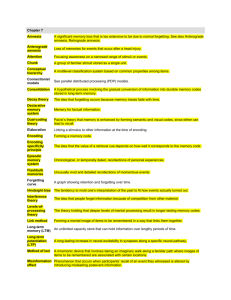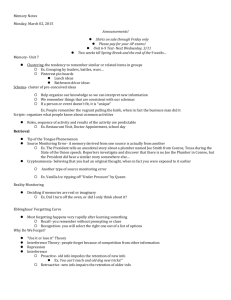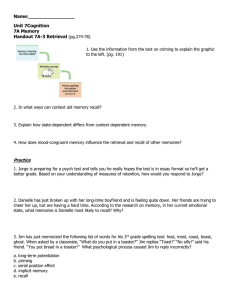Chapter 7 class notes - 6th
advertisement
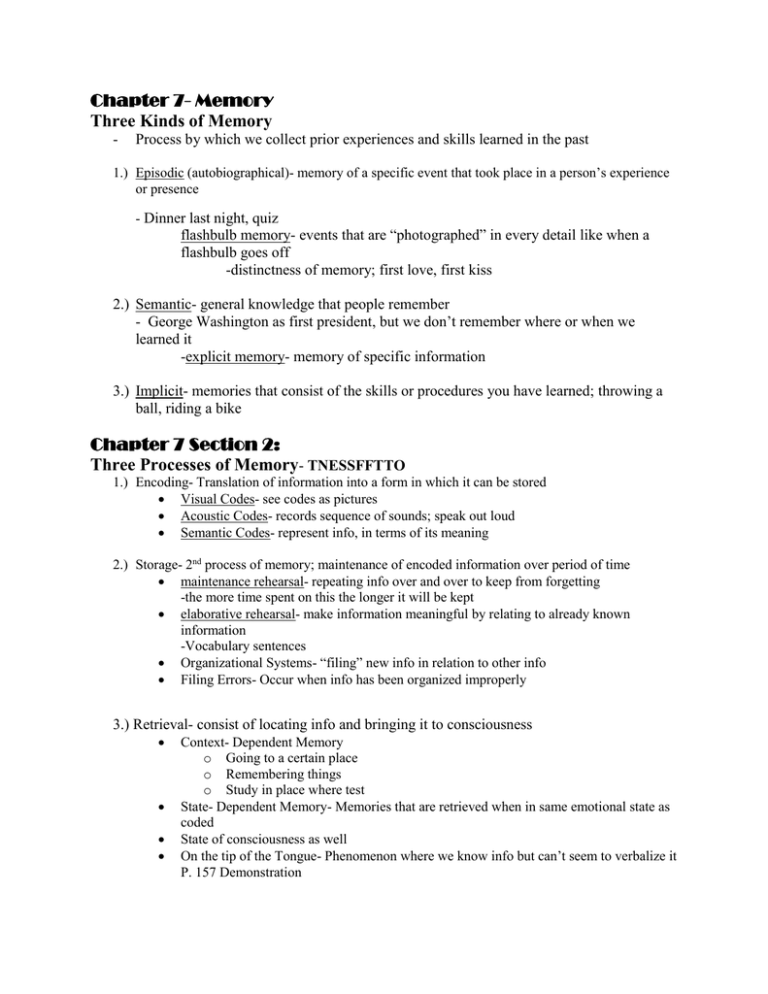
Chapter 7- Memory Three Kinds of Memory - Process by which we collect prior experiences and skills learned in the past 1.) Episodic (autobiographical)- memory of a specific event that took place in a person’s experience or presence - Dinner last night, quiz flashbulb memory- events that are “photographed” in every detail like when a flashbulb goes off -distinctness of memory; first love, first kiss 2.) Semantic- general knowledge that people remember - George Washington as first president, but we don’t remember where or when we learned it -explicit memory- memory of specific information 3.) Implicit- memories that consist of the skills or procedures you have learned; throwing a ball, riding a bike Chapter 7 Section 2: Three Processes of Memory- TNESSFFTTO 1.) Encoding- Translation of information into a form in which it can be stored Visual Codes- see codes as pictures Acoustic Codes- records sequence of sounds; speak out loud Semantic Codes- represent info, in terms of its meaning 2.) Storage- 2nd process of memory; maintenance of encoded information over period of time maintenance rehearsal- repeating info over and over to keep from forgetting -the more time spent on this the longer it will be kept elaborative rehearsal- make information meaningful by relating to already known information -Vocabulary sentences Organizational Systems- “filing” new info in relation to other info Filing Errors- Occur when info has been organized improperly 3.) Retrieval- consist of locating info and bringing it to consciousness Context- Dependent Memory o Going to a certain place o Remembering things o Study in place where test State- Dependent Memory- Memories that are retrieved when in same emotional state as coded State of consciousness as well On the tip of the Tongue- Phenomenon where we know info but can’t seem to verbalize it P. 157 Demonstration Chapter 7 Section 3: Three Stages of Memory 1.) Sensory Memory- consists of the immediate, initial recording of information that enters through out senses; to remember info something must be done quickly iconic memory- memory like a snapshot; accurate photographic memories that are extremely brief- fraction of a second eidetic imagery- the ability to remember visual stimuli over long periods of time (Photographic memory) echoic memory- mental traces of sound that lasts several seconds 2.) Short-Term Memory a.k.a. working memory -consists of information from iconic and echoic memories that you paid attention to -use this memory most of the time; repeating phone # Primacy and Recency Effects primacy effect-the tendency to recall the initial items in a series recency effect- the tendency to recall the last items in a series chunking- the organization of times into familiar of manageable units -George Miller found the average person can hold a list of seven items in short-term memory. *Domino activity with memories for the day* Interference -Occurs when new information appears in short-term memory and takes the place of what is already there -ZBT experiment with college students forget when counting 3.) Long-Term Memory- Final stage of memory where steps must be taken to remember Capacity of Memory - limited to the amount of attention we give it for long-term memory but unlimited quantity Memory as Reconstructive - memories reconstructed from bits and pieces and reconstructed in accordance with our beliefs and needs at the time schemas- mental representations that we form of the world by organizing bits of information into knowledge o Car crash: “hit” 34 mph, “smashed” 41 mph Chapter 7 Section 4: Forgetting and Memory Improvement Basic Memory Tasks Herman Ebbinghaus is credited for the first scientific study of forgetting. He used nonsense syllabus to measure the difference between remembered and forgotten information. 1.) Recognition- identifying objects or events that have been encountered before Ex: multiple choice test -Harry Bahrick examined recognition of classmates’ faces *class discussion on p. 168 using Bahrick’s method 2.) Recall- to bring it back to mind; reconstruct it -Use nonsense syllables with time measurement -Use paired associations- have to recall one pair from one given 3.) Relearning -We can relearn something faster than when we originally learned the information Different Kinds of Forgetting interference decay- the fading away of memory Repression -Freud believed we forget things on purpose; memories that may be painful and unpleasant -push these memories from our consciousness Amnesia Severe memory loss caused by brain injury, shock, fatigue, illness, or repression -Dissociative amnesia is thought to be caused by psychological trauma. Infantile Amnesia- the forgetting of early childhood events Freud- sexual feelings toward parents and aggression- repressed Biological and Cognitive factors- brain not mature enough Anterograde Amnesia Memory loss from trauma that prevents a person from forming new memories -Ex: Fifty First Dates Retrograde Amnesia People forget the period leading up to a traumatic event. -Ex: Football head injury Improving Memory Drill and Practice- repeating over and over until remembered. Ex: flash cards Douglas Hermann- remember names by repeating them right away; “Nice to meet you, Heather.” Relate to Things You Already Know -Requires you to think more deeply about the new information so you may remember it better Form Unusual Associations -Remembering grocery lists by assigning body parts items from the list Construct Links -Peso “People pay with money.” Use Mnemonic Devices -Systems for remembering information Ex. Roy G Biv HOMES- Huron, Ontario, Michigan, Erie, Superior
